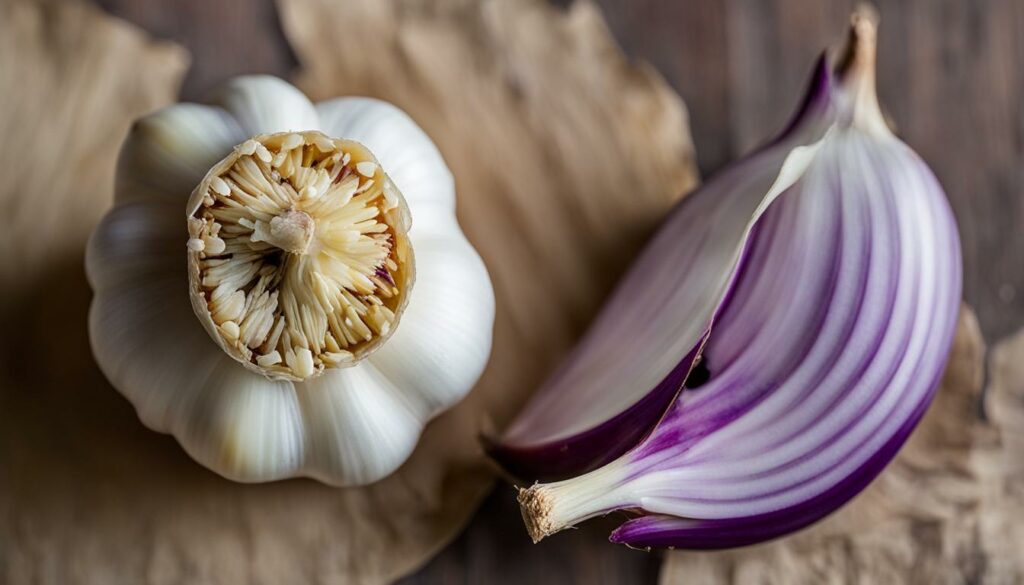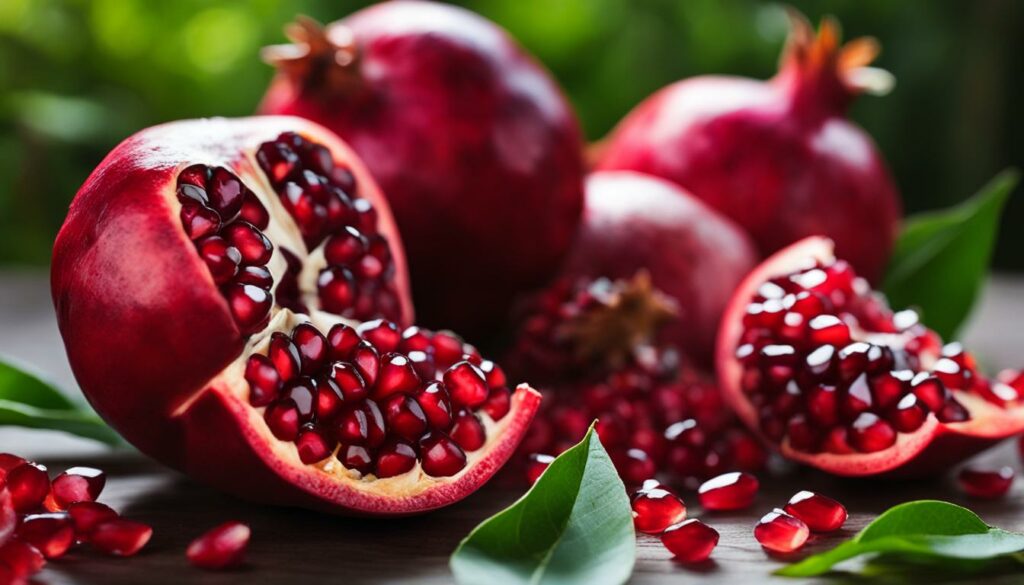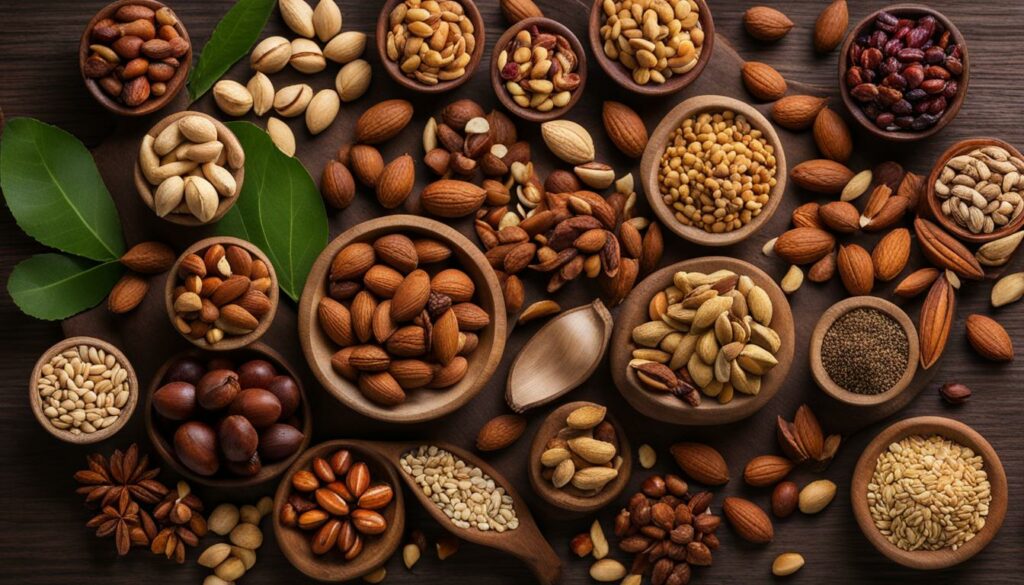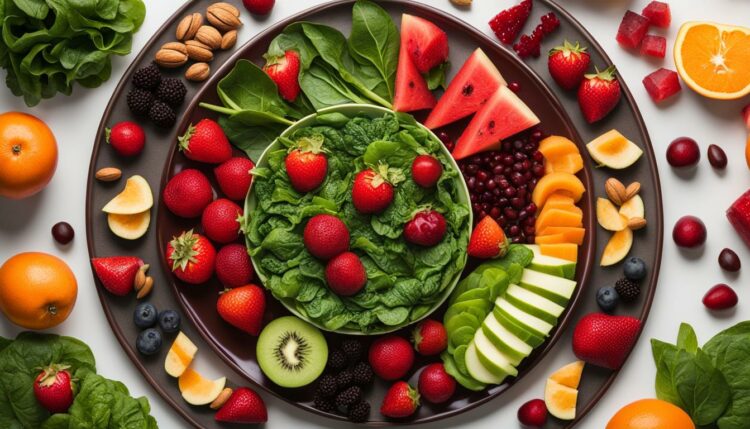Nitric oxide is a vital molecule in the body that helps lower blood pressure, improve blood flow, and boost exercise performance.
Switching up your diet can be an effective way to naturally increase nitric oxide levels. Here, we have compiled a list of the top 10 foods that can help boost nitric oxide production and enhance your sexual health.
Key Takeaways:
- Beets, garlic, meat, dark chocolate, leafy greens, citrus fruits, pomegranate, nuts and seeds, watermelon, and red wine are top foods for naturally boosting nitric oxide levels.
- These foods are rich in dietary nitrates, antioxidants, and other compounds that support nitric oxide production and stability in the body.
- Incorporating nitric oxide-boosting foods into your diet can improve blood pressure, blood flow, exercise performance, and overall sexual health.
- Consult with a healthcare professional before making significant changes to your diet or lifestyle.
- Adding these foods to your diet is a natural, effective, and delicious way to enhance nitric oxide levels and support your cardiovascular health.
Beets
Beets are a natural powerhouse when it comes to boosting nitric oxide levels in the body. These vibrant purple roots are packed with dietary nitrates that have been shown to significantly increase nitric oxide production.
Studies have demonstrated that consuming beetroot juice or beetroot supplements can lead to a substantial rise in nitric oxide levels, benefiting various aspects of health.
The nitric oxide-boosting properties of beets have been linked to improved cognitive function, enhanced athletic performance, and lower blood pressure levels.
Beets are rich in antioxidants and other beneficial compounds, making them a nutritious addition to any diet. Including beets in your meals or enjoying beetroot juice can support your overall health and well-being.
So, whether you’re looking to enhance your cognitive function, improve your athletic performance, or lower your blood pressure, don’t forget to incorporate beets into your diet for their incredible health benefits.
The Benefits of Beets in Boosting Nitric Oxide Levels:
- Increased nitric oxide levels
- Improved cognitive function
- Enhanced athletic performance
- Lower blood pressure levels
Garlic
Garlic is a powerful natural ingredient that can have a positive impact on nitric oxide levels in the body. It contains sulfur compounds that activate nitric oxide synthase, the enzyme responsible for converting L-arginine into nitric oxide.
By increasing nitric oxide production, garlic can support improved exercise tolerance and lower blood pressure levels.
Research has shown that consuming garlic or garlic extract can lead to an increase in blood nitric oxide levels. These increased levels of nitric oxide have been linked to enhanced exercise performance and improved cardiovascular health.
By incorporating garlic into your diet, you can reap the benefits of this incredible ingredient and help maintain optimal nitric oxide levels in your body.

Benefits of Garlic in Boosting Nitric Oxide Levels:
- Activation of nitric oxide synthase
- Increase in blood nitric oxide levels
- Improved exercise tolerance
- Lower blood pressure
Garlic offers a range of cardiovascular benefits. Its ability to increase nitric oxide production contributes to improved blood flow, which in turn supports heart health.
Additionally, the lower blood pressure associated with garlic consumption can help reduce the risk of hypertension, a major risk factor for heart disease.
Meat
Meat, especially organ meats, fatty fish, and muscle meats like beef, chicken, and pork, are high in Coenzyme Q10 (CoQ10). CoQ10 is a compound that plays a crucial role in preserving nitric oxide in the body.
Consuming meat sources rich in CoQ10 not only helps preserve nitric oxide but also contributes to improved athletic performance, heart health, and lower blood pressure. CoQ10 supports nitric oxide production, which is essential for various aspects of cardiovascular function.
Coenzyme Q10 is known for its antioxidant properties and its ability to enhance energy production in cells. By including meat in your diet, you can ensure an adequate intake of CoQ10, which aids in nitric oxide preservation and supports overall health.

Dark Chocolate
Dark chocolate is a delicious treat that also offers numerous health benefits. It is rich in flavanols, which are antioxidants that can increase nitric oxide levels in the body.
Studies have shown that consuming dark chocolate can lead to significant increases in nitric oxide production, which in turn can have a positive impact on heart health and blood flow.
One study found that consuming a small portion of dark chocolate every day for two weeks resulted in improved blood flow and increased nitric oxide levels in healthy adults. Another study demonstrated that dark chocolate consumption was associated with a decrease in blood pressure.
Flavanols found in dark chocolate have also been linked to improved cognitive function and a lower risk of heart disease. These compounds have been shown to enhance brain function and protect against oxidative stress, which can contribute to the development of cardiovascular conditions.

Enjoying a moderate amount of dark chocolate as part of a balanced diet can be a tasty way to support heart health and improve blood flow. However, it’s important to remember that not all chocolate products are created equal.
Look for dark chocolate with a high cocoa content (70% or higher) to ensure you are getting the most flavanols and health benefits.
Leafy Greens
Leafy greens like spinach, kale, and arugula are excellent sources of dietary nitrates, which are essential for nitric oxide production. These greens help in the conversion of nitrates to nitric oxide, enhancing blood flow and cardiovascular health.
Regular consumption of leafy greens can lead to improved exercise performance and sexual vitality. They are also packed with vitamins and minerals, contributing to overall well-being.
Benefits of Leafy Greens in Boosting Nitric Oxide Levels:
- Rich in dietary nitrates for nitric oxide production
- Improve blood flow and cardiovascular health
- Enhance exercise performance
Citrus Fruits
Citrus fruits such as oranges, lemons, and grapefruits are rich in vitamin C, a potent antioxidant that plays a crucial role in maintaining high levels of nitric oxide. Vitamin C helps in preventing the breakdown of nitric oxide, ensuring its availability in the body.
These fruits also contribute to a healthy immune system and provide additional cardiovascular benefits.
Benefits of Citrus Fruits in Boosting Nitric Oxide Levels:
- High in vitamin C to maintain nitric oxide levels
- Support cardiovascular health
- Boost immune system
Pomegranate
Pomegranate is a superfruit known for its high antioxidant content. These antioxidants help protect nitric oxide from oxidative damage, enhancing its effects on blood vessel dilation and blood flow. Regular consumption of pomegranate or its juice can improve exercise endurance and sexual health.

Benefits of Pomegranate in Boosting Nitric Oxide Levels:
- Antioxidants protect nitric oxide
- Improve blood vessel dilation
- Enhance exercise endurance
Nuts and Seeds
Nuts and seeds, such as walnuts, almonds, and flaxseeds, are excellent sources of L-arginine, an amino acid that is a direct precursor to nitric oxide.
They also contain healthy fats and other nutrients that support heart health and nitric oxide production. Including a variety of nuts and seeds in your diet can boost overall health and nitric oxide levels.

Benefits of Nuts and Seeds in Boosting Nitric Oxide Levels:
- Rich in L-arginine for nitric oxide synthesis
- Contain healthy fats for heart health
- Support overall well-being
Watermelon
Watermelon is a refreshing fruit that contains citrulline, an amino acid that boosts nitric oxide production in the body. Citrulline is converted to L-arginine, enhancing the synthesis of nitric oxide. This can lead to improved blood flow and sexual health. Watermelon is also hydrating and provides essential vitamins and minerals.
Benefits of Watermelon in Boosting Nitric Oxide Levels:
- High in citrulline for nitric oxide production
- Improve blood flow
- Hydrating and nutritious
Red Wine
Moderate consumption of red wine can be beneficial for nitric oxide levels due to its high content of antioxidants, particularly resveratrol.
Resveratrol helps in enhancing the production and bioavailability of nitric oxide, thereby improving cardiovascular health and blood flow. However, it’s important to consume red wine in moderation.

Benefits of Red Wine in Boosting Nitric Oxide Levels:
- Rich in antioxidants like resveratrol
- Enhance nitric oxide production and availability
- Improve cardiovascular health
Conclusion
Nitric oxide is a vital molecule that plays a crucial role in maintaining overall cardiovascular health. By incorporating nitric oxide-boosting foods into your diet, you can naturally and effectively increase nitric oxide production in your body.
These foods, including beets, garlic, meat, dark chocolate, leafy greens, citrus fruits, pomegranate, nuts and seeds, watermelon, and red wine, are rich in nutrients and compounds that support nitric oxide production.
Nitric oxide acts as a powerful vasodilator, helping to improve blood flow, lower blood pressure, and enhance exercise performance. It also supports cognitive function and brain health.
By consuming a variety of nitric oxide-boosting foods, you can support your overall cardiovascular health and improve sexual vitality.
While these foods are natural ways to increase nitric oxide levels, it’s important to consult with a healthcare professional before making any significant changes to your diet.
They can help you determine the right approach and ensure that it aligns with your specific health needs. Start incorporating these nitric oxide-rich foods into your diet today and take a step towards a healthier heart and body.
FAQ
What are the top foods to naturally boost nitric oxide?
The top foods to naturally boost nitric oxide include beets, garlic, meat, dark chocolate, leafy greens, citrus fruits, pomegranate, nuts and seeds, watermelon, and red wine.
How do beets help boost nitric oxide?
Beets are high in dietary nitrates, which can significantly increase levels of nitric oxide in the body. They have also been linked to improved cognitive function, enhanced athletic performance, and lower blood pressure levels.
How does garlic boost nitric oxide?
Garlic can boost nitric oxide levels by activating nitric oxide synthase, the enzyme involved in the production of nitric oxide from the amino acid L-arginine. Research has shown that consuming garlic or garlic extract can increase blood nitric oxide levels and improve exercise tolerance. Garlic has also been associated with lower blood pressure.
How does meat help preserve nitric oxide?
Meat, especially organ meats, fatty fish, and muscle meats like beef, chicken, and pork, are high in Coenzyme Q10 (CoQ10), a compound that helps preserve nitric oxide in the body. Getting enough CoQ10 from meat sources can not only preserve nitric oxide but also improve athletic performance, prevent migraines, and promote heart health.
How does dark chocolate boost nitric oxide?
Dark chocolate is rich in flavanols, which can increase nitric oxide levels in the body. Studies have shown that consuming dark chocolate can lead to significant increases in nitric oxide levels and improvements in blood pressure. Dark chocolate consumption has also been associated with improved blood flow, enhanced brain function, and a lower risk of heart disease.
Why is boosting nitric oxide important for overall health?
Nitric oxide plays a crucial role in various aspects of health, including blood pressure regulation, exercise performance, and brain function. Incorporating nitric oxide-boosting foods into your diet is a natural and effective way to increase nitric oxide levels and support your overall cardiovascular health.




